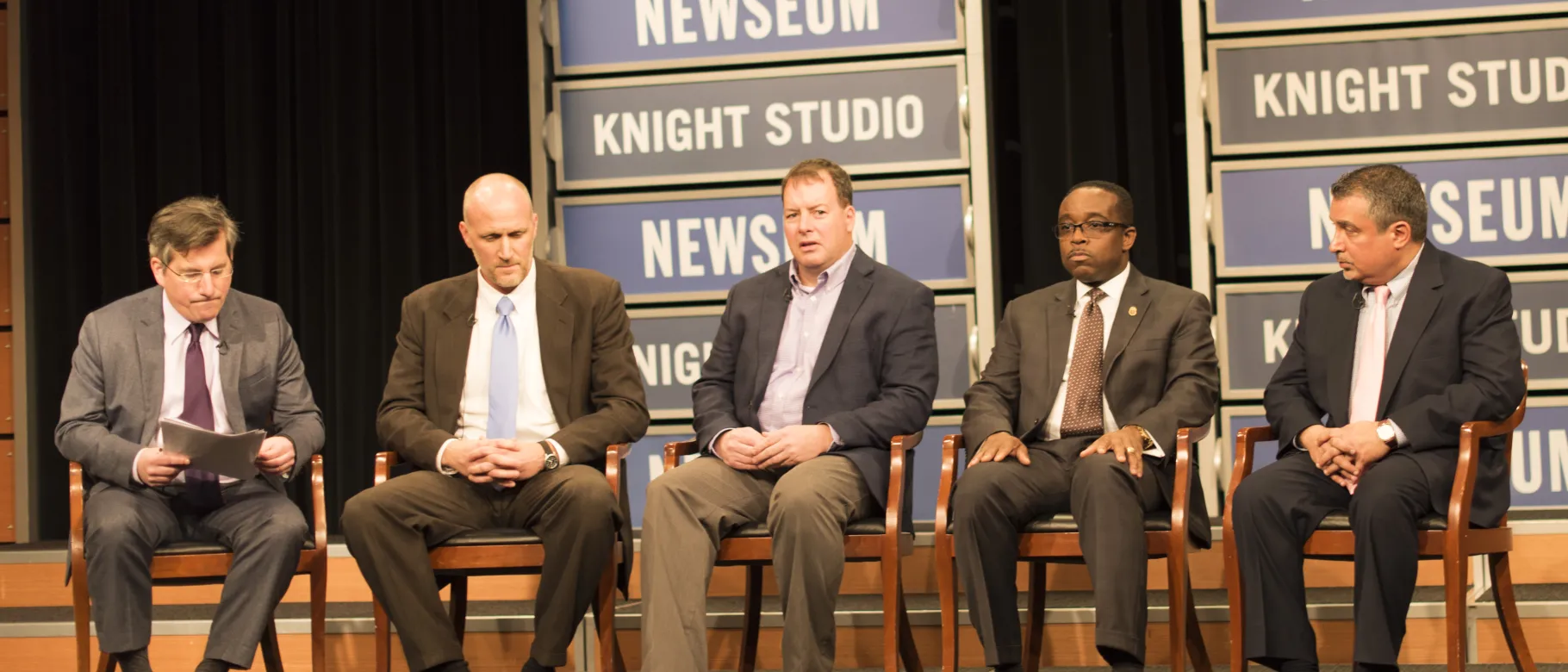UNE vice president of research and scholarship participates in FBI/DEA panel on opioid crisis

On February 4, 2016 Edward Bilsky, Ph.D.,vice-president for research and scholarship for the University of New England participated in a panel discussion in Washington, D.C. on the opioid crisis in America. The event was organized by the Federal Bureau of Investigation (FBI) and the Drug Enforcement Agency (DEA) and included Directors James Comey and Chuck Rosenberg. The directors rolled out a new education and prevention resource that includes Chasing the Dragon, a documentary that highlights the impact of opioid abuse and addiction on individuals, families and communities. The documentary and associated guidebook are expected to be a helpful tool for engaging young adults in a conversation around the dangers of prescription opioids and heroin.
Bilsky was invited to participate in the event following his attendance of a recent Senate Judicial Committee hearing focused on the current heroin and prescription drug misuse crisis in the United States. He has been a leader in the pursuit of a multi-pronged approach to combating addiction. In addition to his role in addiction outreach efforts in Maine communities, Bilsky is among a team of scientists recently awarded a $4.5 million, five-year grant from the National Institute on Drug Abuse (NIDA) of the National Institutes of Health (NIH) to develop novel drugs for the treatment of chronic pain with fewer adverse effects than currently marketed opioid pain-relief medications. The UNE team of scientists and educators also delivers one of the most comprehensive medical and health professional curriculums with respect to pain and substance misuse topics. Their education efforts extend to an award winning K-12 outreach program on brain awareness and safety that includes curriculum on substance misuse and addiction.
Bilsky commented on the past week’s events by saying “It has been an honor to observe and engage in discussions with many different groups in the federal government including senate leadership from Maine and New Hampshire, leaders in law enforcement, and people directly impacted by opioid misuse and overdose. I was profoundly impacted by the Chasing the Dragon documentary, sitting next to two mothers who had lost young daughters to opioid overdoses. Their courage and conviction to come forward and share their stories with the public is inspiring and is a moving tribute to their children. I sense a sea change in our approach to education, prevention and treatment of opioid misuse, one that includes a more comprehensive and holistic plan and better communication and coordination of existing resources.”
Senator Angus King, who is a co-sponsor of new legislation to increase funding to address the opioid crisis commented that “Maine communities have been hit hard by the devastating effects of opioid addiction, but thankfully, dedicated people in Maine are fighting on all fronts from prevention to medical research to curb this complicated problem. Dr. Bilsky and his team at the University of New England are conducting critical neurological research that could help turn the tide against this wave of addiction, and by collaborating with the FBI and DEA to help teach young people about the dangers of opioids, they continue to demonstrate that Maine is at the forefront of this all-important fight for the health and safety of our people.”
Senator Susan Collins stated, “Addiction to heroin and prescription opioids has become a tragic epidemic that continues to have devastating effects on families, communities, and public health in Maine and across the country. I commend Dr. Bilsky and the University of New England for their leadership on research and education efforts that will help mitigate this crisis. Effectively addressing the problem of heroin and opioid dependency in our country requires a comprehensive approach that recognizes the roles of prevention, law enforcement, and treatments, and I look forward to working with the University of New England to address this significant issue. ”